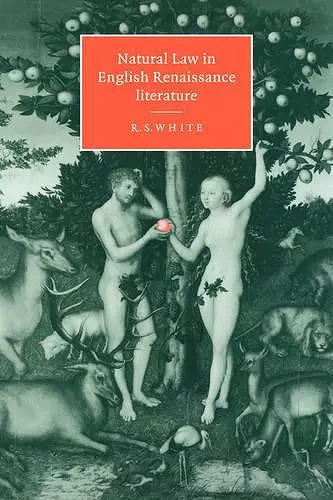Natural Law in English Renaissance Literature
Format:Paperback
Publisher:Cambridge University Press
Published:25th Jan '07
Currently unavailable, and unfortunately no date known when it will be back
This paperback is available in another edition too:
- Hardback£90.00(9780521481427)

A wide-ranging study of a concept which underpinned Renaissance literature and continues to absorb contemporary thinkers.
The concept of natural law dominated Renaissance thought, where its literary equivalent, poetic justice, underpinned much of the period's creative writing. R. S. White's study applies a vast area of intellectual history to imaginative literature across a variety of genres during the Renaissance period.Natural law, whether grounded in human reason or divine edict, encourages men to follow virtue and shun vice. The concept dominated Renaissance thought, where its literary equivalent, poetic justice, underpinned much of the period's creative writing. R. S. White's study examines a wide range of Renaissance texts, by More, Spenser, Sidney, Shakespeare and Milton, in the light of these developing ideas of Natural Law. It shows how writers as radically different as Aquinas and Hobbes formulated versions of Natural Law which served to maintain socially established hierarchies. For Aquinas, Natural Law always resided in the individual's conscience, whereas Hobbes thought individuals had limited access to virtue and therefore needed to be coerced into doing good by the state. White shows how the very flexibility and antiquity of Natural Law enabled its appropriation and application by thinkers of all political persuasions in a debate that raged throughout the Renaissance and which continues in our own time.
"This fine, groundbreaking study analyzes the literature of the period from More to Milton for its engagement of the tradition of natural law, once crucial but now hardly ever remembered until very recently. This is a rich and important book." Anthony Dimatteo, Spenser Newsletter
ISBN: 9780521032896
Dimensions: 228mm x 152mm x 20mm
Weight: 465g
308 pages